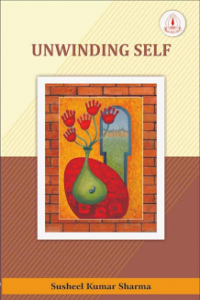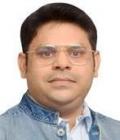Creation and Criticism
ISSN: 2455-9687
(A Quarterly International Peer-reviewed Refereed e-Journal
Devoted to English Language and Literature)
Vol. 06, Joint Issue 22 & 23: July-Oct 2021

Critique
Unwinding Self: India’s Cultural Quintessence
Abhishek Tiwari
‘Know then thyself,’ resounded the veteran poet of British literature, Alexander Pope as a realized experience of human affairs. As a point of fact knowing oneself is the prerequisite to perceive the unknown mysteries pervading the universe. Life is a phenomenon of enigmatic experiences that delves deeper into the collective conscience of humanity. Being a sahridaya --human is a precondition to address the issue of humanism in a surreptitiously muddled social set-up. Poetic creation, no doubt, is a divine inspiration; it is a means to explore the undercurrents of the conscious through the layers of sub conscious. This act is also perceived as a deliberate attempt to transform personal experiences into a saga of universal thought system. Adi kavi Valmiki’s abrupt reaction at the distress of the krauncha bird is a pragmatic model of the process of poetic creativity:
Ma Nishad pratishtam tvamagamah shasvatih samah,
yatkrauncha mithunade kamavadhih kama mohitam!
Quite incredibly, the famous composer of Ramcharitmanas, Tulsidas composes his magnum opus with a view to cultivating self-happiness (swantah sukhay) that offers him a chance to write something from the very core of heart. Matthew Arnold, the epoch making critic and poet, also held poetry as a ‘criticism of life.’
Although writing a poetic work invokes high imagination, largeness of heart, composed and compassionate soul and of course, ‘higher seriousness’ (as suggested by Arnold), yet a reviewer’s job demands a similar set of mind, attitude and creative fervour. I came across this anthology of beautiful poems, Unwinding Self by Susheel Kumar Sharma, a well-known poet and a senior professor of English at University of Allahabad with the curious blend of chance and choice. This collection puts forth the poet in the light of several ideas, thoughts, incidents and socially viable questions. Sharma’s spontaneous voice is the voice of the collective conscience of the humanity. His is a grand visualization of the world that attracts the spiritual and the corporeal alike.
The very opening poem ‘Snapshots’ unfurls the multilayered experiences of an enormous observer. The fragmented thoughts are immensely symbolic of the sense of alienation deep down memory lane. However the interior monologue of the apparently twitchy persona finds solace in the idea of an ironically emotional catastrophe while human beings are but only the mute survivors of the act of God clause — force majeure:
Tsunami hits Japan.
God is resting in Heaven.
Where is my old father?
Emails will be checked later. (1)
‘The End of the Road’ is a poetic metaphor for the bleak realities associated with the old age. Singing the melodies of the gone days of life when things were rapturously well settled, the poet persona feels reflective of the difference between past and present. The spectacle of a joyfully serene youth turns meaninglessly mechanical in the flashy façade of human behaviour:
Now I have six pairs of spectacles.
I have to choose one to suit to the occasion;
The world has lost its original colour. (4)
‘On Reading Langston Hughes’ “Theme For English B”’ is the vision of a new world where a subaltern disciple hopes to attain a place on a par with the so called elite. This poem speaks volumes to the didactically innocuous temperament of the poet who gives voice to the economically weaker section of the society and the former’s deeper empathy with the latter’s hidden inverted snobbery. The vexed enquiry posed by the way of referring to the mythical Guru Dronacharya and his shishya-in-spirit, Eklavya in the background of racial prejudice is a mark of dogged dissent against the moral standards of those who carry onus for the elevation of the subalterns/ have-nots:
Will you be another
Stumbling block on my way?
I am told, you justify Dronacharya’s every act-
Will you repeat him? Will you replicate him? (11)
‘Me, A Black Doxy’ unravels the pain of selling a body with a view to meeting both ends meet. The universal trauma inflicted on the conscience of a sex worker underlies the hope of the heart. Sharma’s humane submission, for sure, is becoming of a humanistic way of life. The female persona’s compassion for the wife and children of her customer is a rare act of a daring body and a bold profession with a divine heart: “He could have spent that amount/On his wife, on his children.”
Sharma’s another poem “A Voice” poses the position of a poet without any proper job of his/ her own. The concern of the poet is practically bleak in the postmodernist consumer oriented social scenario. This poem further depicts the poet’s conviction in the fact that for becoming a poet, he / she ought to have regular economic resources. Merely being a poet for the sake of becoming the same would do little to support his/ her familial accountability. The poet emerges as a champion of woman psyche in Bubli poems. Composed in 11 segments, this long poetic series sings the evolution of a girl named Bubli in various up and downs. The path of progress that she undertakes becomes the fatal design of her ambitious desires. The poet brings to the fore the challenges of favouritism and male chauvinism faced by a lower middle class girl on the way of a glamorous career which offers nothing but a fair appearance with its foul paraphernalia of lust and desire:
The coach said she could not be recommended
To represent the state if she did not meet
The Secretary of the Association privately. (43-44)
As the pinnacle of accomplishment is short lived, Bubli, reluctantly seeks solace in the divine way as enunciated by the great spiritual voices “not yet ready for salvation”. The mild reference to Yeats (crazy salad) and Thomas Gray (curfew tolls the knell of the parting day) adds to the allusive literariness of the poem. ‘Kabir’s Chadar’ is a dispassionate study in the binaries of life. The poet finds it quite strange to follow the famous mystic- poet Kabir’s idea of purity and remaining aloof of the dilemmas and duality that life is made of. Not a simple man can go Kabir’s way – Jyon ki tyon dhar dini chadariya -- along with the fecundities of human body in a ruthless world of cut throat competitions.
Even the blood stains of abortion
The burn marks of jealousy
The blotches of over-ambition
The pigments of infamy
The splatter of calumny
The spatter of canards
The invectives of distrust
Go unnoticed on mine. (50-51)
‘The Kerala Flood 2018’ depicts the politics involved in various utterances of grievance even during crisis. The goodness and ruthlessness of intention is perceived/evaluated during happy times. A poverty stricken victim doesn’t have any other religion but to get his basic needs gratified:
Some say help only from
Good is welcome.
Some say it is vile and be stopped.
Does a victim have a choice? (56)
Likewise, ‘Renewed Hope’ brings to the fore the feelings of a motherly figure in delivering best education to her son at any cost without any demand whatsoever and praying for his well being. ‘Akshya Tritya,’ according to the poet is the idea of an auspicious grandeur. It is symptomatic of the Indian belief system while ironically putting forth commercialization associated with it. Likewise, ‘A Family by the Road’ focuses on the apparently horrendous lives of those living near traffic signals in the metropolitan cities. Sharma’s immaculate observation finds heights in narrating his poem ‘Connaught Place’. To the poet, this place is a symbol of metropolitan heritage that treats everyone alike: “Indian and foreign, male and female;/ Each one has to bargain.” (83)
The last one in the collection titled ‘Stories from the Mahabharata’ broods over the grand narrative of the poem in the current contexts. The trials, tribulations and the treachery faced by the heroes of the Mahabharata is not the issue of the past; rather it has become a lesson of human existence and survival. The quest remains an expedition through and through. We seek answers but the answer drastically begets cross questions:
The prince becomes Brihannala.
Dancing is necessary
To the tune of the flute. (87)
Susheel Kumar Sharma’s wisdom and perspicacity finds scintillating coverage in this anthology. Like a Hrishi-Kavi (the Ascetic Poet) he observes the spectacles around him with a vision that comes out of the view of the Infinite. For the globe which seems to be a place of materialistic activities leading to self gratification as the sole goal, Sharma’s arresting insights find in it the strife, struggle and the satiety of the human consciousness, that is no other than the Divine consciousness. The engaging style that he undertakes in composing his emotions suits the tenor and tone of his purpose behind the same. The great Indian tradition finds its majestic utterance in Sharma’s creative oeuvre. The allusion to a large number of world scholars and texts speak volumes to his dynamic stature as a visionary philosopher who is all aware of the fact that the tongue of human emotion is one; presentations vary time and again. Like an observer-seer and sometimes a conscientious dissenter speaking on assorted themes like coffee, childhood, hope, sinner, Sahib, et cetera, Sharma embarks on a path of greatly serious speculations of societal hegemony, narratives and constructs while depicting tolerance, pluralism, multiculturalism, Atma- Dharma, and Atma- Darshan as India’s cultural quintessence.
It would not be otherwise to say that this anthology accomplishes the critical and creative heights as desired and enunciated by the great critics of the like of Matthew Arnold and T S Eliot. Obviously, this critically aesthetic document is a passport to understand what true Indian sensibility is and how it attains universal brotherhood and humanitarian outlook by its moralistic merits. In my good faith this epoch making collection deserves special reception and attention by the scholarly circle around the world for being able to read between the lines the broader humanistic world view painted on the canvas of consciousness that goes beyond the narrations of nations. Sharma’s arduous inventiveness in shaping his ideas (in line with Samuel Beckett’s ‘shape of ideas’) in a befitting diction adds decorum to the allegory of ideas. It is humanism in genuinely symbolic action.
Work Cited
Sharma, Susheel Kumar. Unwinding Self (A Collections of Poems). Vishvanatha Kaviraja Institute, Cuttack, 2020 (All the references are taken from its text)
About the Author:
 Dr Abhishek Tiwari received his doctoral degree from the prestigious University of Allahabad. Author of an anthology of poems in English, The Painted Paraphernalia and other Speculations published recently from Notionpress.com, Chennai, India, he teaches English at the Department of Humanities, Sri Lal Bahadur Shastri National Sanskrit University (A Central University), B-4 Qutab Institutional Area, New Delhi, India and can be reached at abhishek_abhi.au@rediffmail.com.
Dr Abhishek Tiwari received his doctoral degree from the prestigious University of Allahabad. Author of an anthology of poems in English, The Painted Paraphernalia and other Speculations published recently from Notionpress.com, Chennai, India, he teaches English at the Department of Humanities, Sri Lal Bahadur Shastri National Sanskrit University (A Central University), B-4 Qutab Institutional Area, New Delhi, India and can be reached at abhishek_abhi.au@rediffmail.com.


